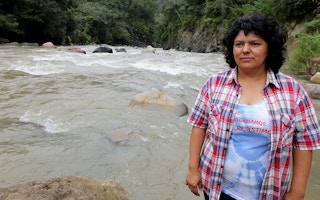Berta Cáceres, a Honduran indigenous and environmental leader and Goldman Environmental Prize Winner has been assassinated.
Those words sent ripples of shock through human rights defenders both in Honduras and internationally. “What can we do about this?” said Danielle Andrade, an environmental lawyer from Jamaica.” “I was moved to tears, and I prayed for her family and community,” said activist Karetta Crooks from St. Lucia.
Clarisa Vega from IDAHMO Honduras, an environmental law organization, asked for support to ensure that justice was sought. And still others shared their anger that governments in the region need to do more to protect environmental defenders and put a stop to harassment and intimidation.
Indeed, Cáceres’s murder is both tragic and senseless. She fought tirelessly for the rights of Honduras’s Indigenous Peoples, including opposing the Agua Zarca Dam, which would obstruct the Gualcarque River, a source of food and water for local communities. Media reports say that she received death threats from police, the army and landholders’ groups.
A systemic problem
Unfortunately, Cáceres’s death is just the most recent attack on an environmental defender. Global Witness’s groundbreaking reports How many More and Deadly Environment highlight the historical vulnerability of those who fight to protect the earth. One hundred and sixteen environmental activists were murdered in 2014 alone. The fact that Honduras is number one in the world for the killing of environmental defenders in Global Witness’s report (per capita) indicates the dire state of affairs.
Cáceres famously said “Nobody heard our voices until we set up a roadblock to defend our territory.” That quote illustrates the problem at the heart of all these attacks on environmental activists—few countries actually guarantee citizens’ rights to safely make their voices heard on environmental issues.
The Environmental Democracy Index evaluates the status of national laws related to the protection of “procedural rights,” or citizens’ legal rights to access information, participate in environmental decision-making processes and seek justice in circumstances where their rights are infringed upon. Honduras scored “less than average” on the Index, ranking 43rd out of 70 countries. In fact, only half the countries included in the Index scored “good” or “above average” on national procedural rights laws. And having laws on the books doesn’t mean that they are necessarily enforced.
“
Cáceres’s murder is both tragic and senseless. She fought tirelessly for the rights of Honduras’s Indigenous Peoples, including opposing the Agua Zarca Dam, which would obstruct the Gualcarque River, a source of food and water for local communities.
Protecting the world’s environmental defenders
Protecting environmental defenders requires action to prevent threats and provide security for citizens who are making their voices heard. It requires creating fair and equitable forums for decision-making about potentially environmentally destructive or damaging projects, such as dams, highways, mining sites, factories and more.
It requires early notification, consultation and consent from indigenous communities to use their natural resources. It also requires judicial systems that work to hear the grievances of those most affected. And it requires that governments recognize community’s traditional use of natural resources and their rights to land and territory.
Moreover it is the government’s duty to level the playing field between communities and often powerful corporate actors. Even more care must be taken when governments themselves are proposing mega infrastructure projects to boost economic development.
Governments around the world should evaluate their national laws—or lack thereof—designed to protect citizens’ environmental democracy and procedural rights. States in the Latin America and Caribbean (LAC) region in particular could commit to the LAC Principle 10 Regional Declaration, a process governed by the UN Economic Commission for Latin America and the Caribbean (UNECLAC) to develop new standards for laws on procedural rights and the protection of environmental defenders. This opportunity cannot be wasted.
I would encourage everyone who has never heard of Berta Cáceres to view the amazing video produced by the Goldman Prize about her work. It is an inspiration to me personally. In it, she speaks of the risk to her life, but her determination to stand up for Mother Earth and the urgency of the fight.
My heart and thoughts—as well as those of many members of The Access Initiative—go out to her family and community at this time. The world has lost an amazing woman; Honduras has lost an environmental justice champion.
Carole Excell is the Project Director, The Access Initiative at the World Resources Institute. This post is republished from WRI’s blog.









